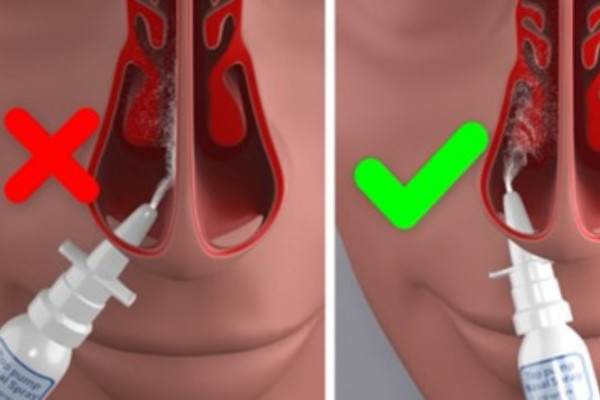Univent nasal spray
Also called ipratropium
Key points about Univent nasal spray
- Univent nasal spray helps to relieve a runny nose caused by hay fever (also called allergic rhinitis), the common cold or other reasons.
- It's also called ipratropium which sounds like 'eye-pra-troe-pee-um'
- Find out how to use it safely and possible side effects.

Univent nasal spray helps to relieve a runny nose caused by hay fever (also called allergic rhinitis), the common cold or other reasons, such as smoky environments or spicy food. It works by stopping the mucus glands in your nose from overproducing watery mucus.
- The usual dose of Univent nasal spray is 2 sprays into each nostril 2 to 3 times each day.
- If you're using Univent nasal spray for a runny nose caused by a cold, you'll only need to use it for a few days (up to 4 days).
- If you're using it for hay fever or allergies, you may need to use it regularly and for longer.
- It can also be used just before you'll be exposed to allergens that you know cause reactions, eg, smoky environments.
- Follow the instructions on the packaging or the pharmacy label – it will tell you how much to use, how often to use it and any special instructions.
To get the most benefit, use the correct technique. This makes sure you receive the right amount of medicine. Ask your healthcare provider to show you how to use your nasal spray.
The best technique for nasal sprays involves the following:
- Tilt your head forward.
- Direct the nozzle slightly away from the middle to avoid contact with the septum (the middle of the nose which separates the left and right airways in the nose). This will avoid damaging the tissue and causing nose bleeds.
The picture below shows the correct position to hold the tip of the spray in the nostril.

Image credit: ©2023 BMJ Publishing Group Ltd. From Teaching patients to use nasal sprays(external link) 2023.
The following steps are a guide to using a Univent nasal spray:
- Gently blow your nose with a tissue to clear your nostrils.
- Shake the nasal spray bottle and remove the cap before use.
- The first time you use the pump spray each day, you may have to “prime” it. Do this by squirting it a few times into the air until a fine mist comes out.
- Hold the pump spray with your index and middle fingers on each side of the bottle with your thumb on the bottom of the bottle.
- Tilt your head forward and gently put the nozzle into 1 nostril.
- Direct the nozzle toward the back of your head and slightly away from the middle (as shown in the picture above).
- Close the other nostril with your other hand.
- With your mouth closed, pump 2 sprays into your nostril. Breathe in slowly and gently as you spray.
- After spraying the nostril and removing the unit, tilt your head backwards for a few seconds to let the spray spread over the back of your nose.
- Breathe out through your mouth after each spray.
- Remove the bottle and sniff gently once or twice. Don’t sniff too hard because it will go past the nose to the throat and give you an unpleasant taste.
- Try to avoid blowing your nose for a few minutes as you want as much of the medicine to stay in your nose and sinus as possible.
- Repeat the steps for your other nostril.
- Wipe the spray tip with a clean tissue after each use.
- Replace the cap after each use.
Read more and watch a video about how to use a nasal spray.
Univent can be used in children 12 years of age and over. Read more about using nasal sprays in children.
Here are some things to know when you're using Univent. Other things may be important as well, so ask your healthcare provider what you should know about.
- Driving: The nasal spray can make you feel dizzy or give you blurred vision so be careful when driving or using tools until you know how this medicine affects you.
- Take care not to get the spray into your eyes. If this happens, rinse your eyes thoroughly with water.
Like all medicines Univent nasal spray can cause side effects, although not everyone gets them. Often side effects improve as your body adjusts to the new medicine.
| Side effects | What should I do? |
|---|---|
|
|
|
|
|
|
Read more about medicines and side effects and reporting a reaction you think might be a side effect.
The following links provide further information on ipratropium nasal spray. Be aware that websites from other countries may contain information that differs from New Zealand recommendations.
Ipratropium nose spray(external link) Patient, UK
Resources
5 questions to ask about your medications(external link) Health Quality and Safety Commission, NZ English(external link), te reo Māori(external link)
References
- Ipratropium bromide(external link) New Zealand Formulary
- Management tips for the common cold(external link) Goodfellow Gems, NZ, 2018
Brochures

Medicines and side effects
Healthify He Puna Waiora, NZ, 2024

Health Quality and Safety Commission, NZ, 2019 English, te reo Māori
Credits: Healthify editorial team. Healthify is brought to you by Health Navigator Charitable Trust.
Reviewed by: Stephanie Yee, Pharmacist, Auckland
Last reviewed:
Page last updated:





